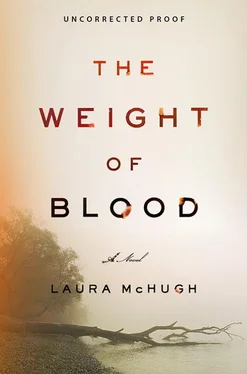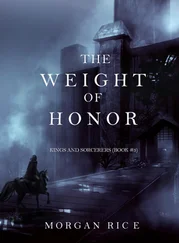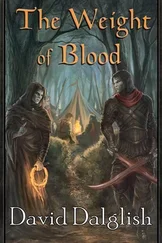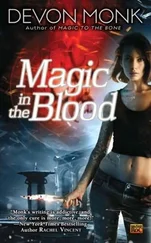Laura McHugh
THE WEIGHT OF BLOOD
A Novel
For Brent, Harper, and Piper

That Cheri Stoddard was found at all was the thing that set people on edge, even more so than the condition of her body. One Saturday in March, fog crept through the river valley and froze overnight. The morning sun crackled over a ghostly landscape across the road from my uncle’s general store, the burr oaks that leaned out over the banks of the North Fork River crystallized with a thick crust of hoarfrost. The tree nearest the road was dead, half-hollow, and it leaned farther than the rest, balanced at a precarious angle above the water. A trio of vultures roosted in the branches, according to Buddy Snell, a photographer for the Ozark County Record . Buddy snapped pictures of the tree, the stark contrast of black birds on white branches, for lack of anything better to print on the front page of the paper. It was eerie, he said. Haunting, almost. He moved closer, kneeling at the water’s edge to get a more interesting angle, and that was when he spied the long brown braid drifting in the shallows, barely visible among the stones. Then he saw Cheri’s head, snagged on a piece of driftwood: her freckled face, abbreviated nose, eyes spaced too wide to be pretty. Stuffed into the hollow of the tree were the rest of Cheri’s pieces, her skin etched with burns and amateur tattoos. Her flesh was unmarked when she disappeared, and I wondered if those new scars could explain what had happened to her, if they formed a cryptic map of the time she’d spent missing.
Cheri was eighteen when she died, one year older than me. We’d lived down the road from each other since grade school, and she’d wander over to my house to play whenever she felt like it and stay until my dad made her leave. She especially liked my Barbies because she didn’t have any dolls of her own, and we’d spend all day building little houses for them out in the woodpile, making swimming pools with the hose. Her mom never once called or came looking for her, not even the time I hid her in my closet so she could stay overnight. My dad found out the next morning and started hollering at us, but then he looked at Cheri, tears dripping off her face as she wolfed down the frozen waffles I’d made her, and he shut up and fried us some bacon. He waited until she finished eating and crying before giving her a ride back home.
Kids at school—including my best friend, Bess—thought Cheri was weird and didn’t want to play with her. I knew Cheri was slow, but I didn’t realize there was actually something different about her until fourth or fifth grade, when she disappeared into the special ed class for most of the day. Newspaper articles after the murder described her as “deficient” or “developmentally disabled,” with the mental capacity of a ten-year-old. We weren’t as close in high school—I’d outgrown her in certain ways and spent most of my time with Bess—but we still shared a bus stop at the fork of Toad Holler Road, and she was always there first, sitting on a log under the persimmon trees, smoking cigarettes she’d steal from her mother and picking at her various scabs. She always offered me a cigarette if she had one to spare. I didn’t know how to inhale, and she probably didn’t, either, but we sat there every morning, elbow to elbow, talking and laughing in a cloud of smoke.
One morning I beat Cheri to the bus stop. I got worried when the bus rumbled up the dirt road and she still wasn’t there, because her mom always sent her to school, sick or not, if only to get her out of the way. Days passed with no sign of her, so I walked through the woods to her mom’s trailer and knocked and knocked, but nobody answered. There were rumors she’d dropped out of school, and when somebody from the county finally went to check it out, Doris Stoddard said her daughter had run away. She hadn’t reported her missing because she figured she would come back.
Flyers were posted in shopwindows around town, and I taped several up at my uncle’s store, Dane’s, which had been in our family for generations. Above Cheri’s picture, in thick black print, was the word runaway. I wasn’t convinced that she’d left on her own, but no one shared my concern. In time, the flyers faded and curled, and when they came down, no new ones went up in their place.
A year passed between Cheri’s disappearance and her murder, and during that time hardly anybody spoke of her. It felt like nobody missed her besides me. But as soon as her body turned up, it was all anybody could talk about. It was the biggest news to hit our tiny town of Henbane in years. Camera crews arrived in hordes, parking their vans by the river to get a shot of the tree, which had sprouted a modest memorial of stuffed animals and flowers. They barged into Dane’s demanding coffee and Red Bull and complaining about the roads and poor cell phone service. People who had ignored Cheri while she was alive were suddenly eager to share their connections to the now-famous dead girl . I used to sit behind her in health class.… She rode on my tractor one year in the Christmas parade.… I was there that time she threw up on the bus.
The whole town jittered with nervous speculation, wondering where she’d been for that missing year and why she’d turned up now. It was common knowledge that in the hills, with infinite hiding places, bodies disappeared. They were fed to hogs or buried in the woods or dropped into abandoned wells. They were not dismembered and set out on display. It just wasn’t how things were done. It was that lack of adherence to custom that seemed to frighten people the most. Why would someone risk getting caught to show us what he’d done to Cheri when it would’ve been so easy to keep her body hidden? The only reasonable explanation was that an outsider was responsible, and outsiders bred fear in a way no homegrown criminal could.
In the wake of Cheri’s murder, Meyer’s hardware ran out of locks and ammunition. Few people went out after dark, and those who did were armed with shotguns. My dad took precautions, too. He worked construction jobs where he could get them, usually a couple hours away in Springfield or Branson, and he had been letting me stay home alone a couple days at a time while he was gone. After Cheri’s body was found, he went back to driving the round trip every day, spending hours on the road so he could be home with me at night.
I replayed our mornings together, Cheri’s and mine, sifted through our last conversations. She’d talked mostly about her “boyfriends,” pervs who hung around her mom’s trailer and told her she was pretty and tried to feel her up. Boys our age, the ones at school, were cruel. They called her a retard and made her cry. I told her to ignore them, but I never told them to stop, and that’s what I remembered when Cheri’s body turned up in the tree: the ways I had failed her. Like how I’d been her best friend but she wasn’t mine. How I’d worried something bad might have happened when she went missing, but I didn’t do anything about it. All the way back to when we were little, me being less of a friend than she thought I was. I gave her my Happy Holidays Barbie, not because it was her favorite but because I had ruined its hair.
Spring was short-lived. The hills were ecstatic with blooms, an embarrassing wealth of trees and wildflowers: dogwoods in cream and pink, clouds of bright lavender redbuds, carpets of phlox and toothwort and buttercups. Then the leaves filled out the canopy, draping the woods in shadow. The vines and underbrush greened and resumed their constant creeping, and the heat blossomed into a living thing, its unwanted hands upon us at all times. Cheri had been buried at Baptist Grove in a child’s casket—which was cheaper and plenty big to hold what was left of her—but I couldn’t stop thinking about her, how she’d shared so much with me but hadn’t said a word about running away.
Читать дальше













